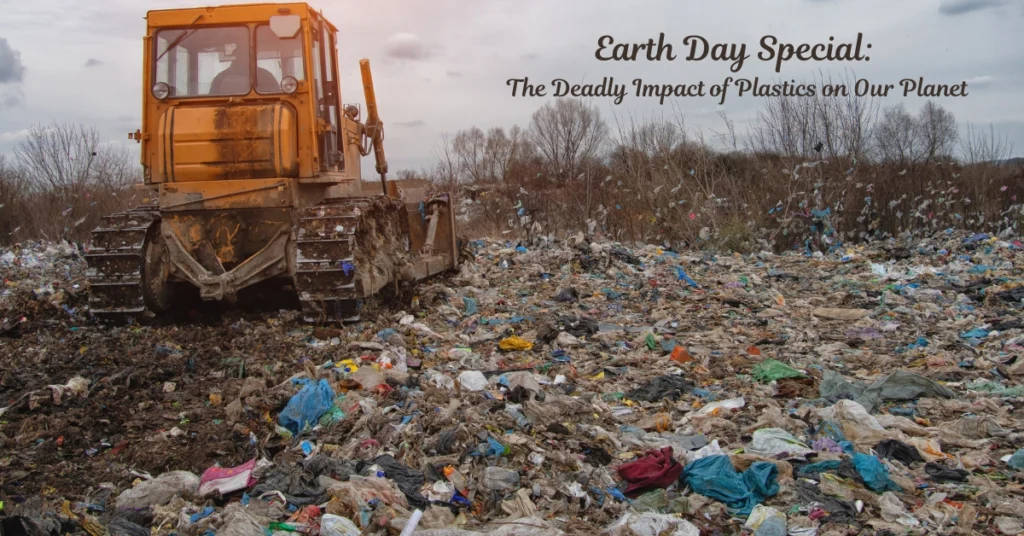Happy Earth Day!!
Every year on April 22, the world comes together to celebrate Earth Day, a global event dedicated to environmental protection and sustainability. What started in 1970 as a grassroots movement in the United States has now evolved into one of the largest civic observances in the world. However, as we step into Earth Day 2025, the planet continues to face one of its gravest threats—plastic pollution. Covid 19 outbreak was thought to be one of the biggest lessons for the population on the Earth but humans are the toughest species to be taught.
The Plastic Predicament
Plastics were once hailed as a revolutionary material—lightweight, durable, and cheap. But decades of excessive production and poor waste management have turned this boon into a curse. According to the United Nations Environment Programme (UNEP), the world produces over 430 million tonnes of plastic every year, two-thirds of which are short-lived products that quickly become waste. Impact of plastic pollution on the environment has been detrimental in the positive growth of the environment.
Impact of plastic pollution on the environment
Here are some alarming facts that reveal the depth of the crisis:
1. 8 Million Tonnes Enter Oceans Every Year
Each year, 8 million tonnes of plastic end up in the oceans, according to National Geographic. This is equivalent to dumping one garbage truck full of plastic into the ocean every minute. Marine life—including turtles, whales, and seabirds—often mistake plastic for food, leading to fatal consequences.
2. Microplastics Are in Our Food and Water
Plastics don’t biodegrade; they break down into microplastics—particles smaller than 5mm. A 2021 report by the World Health Organization (WHO) revealed that microplastics have been detected in 90% of bottled water and 83% of tap water samples globally. We’re literally drinking plastic.
3. A Plastic Bottle Takes 450 Years to Decompose
A single plastic bottle can take up to 450 years to decompose in the environment. Meanwhile, it releases toxic chemicals into the soil and water, endangering ecosystems.
4. Greenhouse Gas Emissions from Plastics
Plastic is a petroleum-based product, and its entire lifecycle—from extraction to disposal—emits greenhouse gases. By 2050, plastic production and incineration could generate 2.8 gigatons of CO₂ emissions per year, equivalent to 615 coal-fired power plants, according to a 2019 study by the Center for International Environmental Law (CIEL).
5. Landfills Overflowing with Plastic
Globally, over 79% of all plastic waste ever produced is either in landfills or the natural environment. Only 9% is recycled, and 12% is incinerated. Landfills not only consume valuable land but also release methane—a potent greenhouse gas.
Also Read: Sustainable Fashion: Reducing Environmental Impact, Empowering People
Who Pays the Price?
-
Wildlife: Over 1 million marine animals die each year due to plastic ingestion or entanglement.
-
Humans: Toxic additives in plastics are linked to hormonal disruption, cancers, and developmental issues.
-
Future Generations: The plastic we throw today will outlive us all.
What Can Be Done?
Earth Day is a time to reflect, but more importantly, to act. The theme for Earth Day 2025 is “Planet vs. Plastics”, calling for a 60% reduction in plastic production by 2040. Here’s how individuals and governments can help:
-
Reduce single-use plastics: Carry reusable bags, bottles, and cutlery.
-
Support legislation: Advocate for policies that ban unnecessary plastic use.
-
Choose sustainable brands: Opt for businesses that use eco-friendly packaging.
-
Educate and inspire: Spread awareness in schools, communities, and workplaces.
Earth Day should not be just one day of care—it should be a daily commitment. Impact of plastic pollution on the environment is not distant; it’s in our oceans, in our food, and even in our blood. As we mark another Earth Day, let’s pledge to make conscious choices, push for systemic change, and give our planet the respect and protection it so desperately needs.
Because Earth doesn’t need us. We need Earth.




One Response